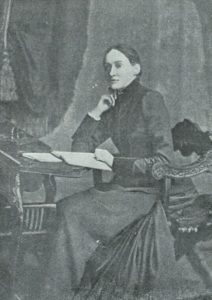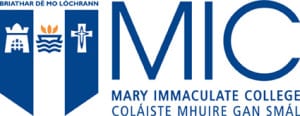Podcasts
Following our successful symposium and launch of the Irish Women Writers (1880-1910) Network in November 2016, we are delighted make available the podcasts of three of the plenary lectures from that symposium:
Professor Margaret Kelleher:
Literary Cabinets and ‘Who’s in, Who’s Out’: Katharine Tynan (1902) and her Successors
A handout to accompany the lecture is available here.
Professor Margaret Kelleher was awarded the Chair of Anglo-Irish Literature and Drama, University College Dublin, in 2012. For the previous five years, she was founding director of An Foras Feasa: the Institute for Research in Irish Historical and Cultural Traditions, at NUI Maynooth. She is also Chair of the Board of the Irish Film Institute. Her books include The Feminization of Famine (published by Duke UP and Cork UP, 1997) and the landmark publication The Cambridge History of Irish Literature (2006), co-edited with Philip O’Leary. She was a contributing editor to Field Day Anthology Volumes 4 and 5, and editor of the special issue on the Irish Literary Revival for Irish University Review (2003). Her primary research interests include nineteenth-century literature, famine literature, women’s writings, cultural history, and the historical relationship between literature in English and Irish.
To Reference:
Bibliography:
Irish Women’s Writing Network (2016), ‘Literary Cabinets and ‘Who’s in, Who’s Out’: Katharine Tynan (1902) and her Successors by Professor Margaret Kelleher’, Plenary Lectures Podcast, November 2016, Available: https://irishwomenswritingnetwork.com/podcasts/, Accessed: Date.
In Text: …Irish Women’s Writing (1880-1920) Network 2016….
*****
Professor Gerardine Meaney:
Digital Methodologies and Irish Women’s Writing: Researching Katherine Cecil Thurston
The powerpoint presentation can be viewed here.
Professor Gerardine Meaney is Professor of Cultural Theory and Director of the UCD Humanities Institute. Her current research interests are in gender, ethnic and national identities in literature and culture and the application of new digital methodologies to humanities research. She is the author of Reading the Irish Woman: Cultural Encounter and Exchange, 1714-1960, with Bernadette Whelan and Mary O’Dowd (Liverpool: Liverpool University Press, 2013); Gender, Ireland and Cultural Change (New York: Routledge, 2010) intro online; Nora, Ireland into Film Series (Cork: Cork University Press and the Irish Film Institute, 2004); (Un)like Subjects: Women, Theory, Fiction (London and New York: Routledge, 1993; reissued Routledge Library Editions, 2012) and 26 articles and book chapters on gender and culture, from Joyce to The Wire. She was one of the major co-editors of the Field Day Anthology of Irish Writing: Women’s Writing and Traditions, volumes 4 and 5 (Cork: Cork University Press, 2002). Her current major research project is ‘Nation, Genre and Gender: A Comparative Social Network Analysis of Irish and English Fiction, 1800-1922, funded by the IRC.
To Reference:
Bibliography:
Irish Women’s Writing Network (2016), ‘Digital Methodologies and Irish Women’s Writing: Researching Katherine Cecil Thurston by Professor Geraldine Meaney’, Plenary Lectures Podcast, November 2016,Available: https://irishwomenswritingnetwork.com/podcasts/, Accessed: Date.
In Text: …Irish Women’s Writing (1880-1920) Network 2016….
*****
Professor Heidi Hansson:
Intellectual Journals and the Woman Writer: The Example of the Nineteenth Century
Professor Heidi Hansson, Professor of English and newly appointed Vice-Rector for Internationalisation at Umeå University, Sweden. Among other things, her research has concerned postmodern romance, Irish women’s literature and Irish book history. She has published extensively on Emily Lawless and edited and co-edited several essay collections on Irish women’s writing including most recently with James H. Murphy Fictions of the Irish Land War (2014). Between 2002 and 2009 she led the interdisciplinary research programme Foreign North: Outside Perspectives on the Nordic North. Currently, she is developing a research project about the forms of fiction in nineteenth-century intellectual periodicals. Another strand in her research can be located on the border of language and literature, for instance studies of gendered metaphors and discourse analysis in a wider sense. She is interested in the relations between text and landscape, and have used eco-critical perspectives to understand phenomena in both fiction and non-fiction.
To Reference:
Bibliography:
Irish Women’s Writing Network (2016), ‘Intellectual Journals and the Woman Writer: The Example of the Nineteenth Century by Professor Heidi Hansson’, Plenary Lectures Podcast, November 2016,Available: https://irishwomenswritingnetwork.com/podcasts/, Accessed: Date.
In Text: …Irish Women’s Writing (1880-1920) Network 2016….
*****
Inspiration for students and scholars alike working in this field, these lectures offer an insight into the diversity and richness of the material and texts, still relatively under-examined and unexplored.
The range of papers on diverse writers, some better known and some not at all, gave another glimpse of these riches and the interdisciplinary nature and possibilities of further research.
See our symposium page for the full programme.



